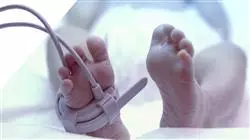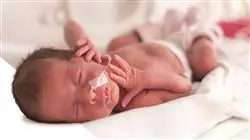University certificate
The world's largest faculty of medicine”
Introduction to the Program
A 100% online Postgraduate diploma that brings you the most complete and current information on Newborn Care”

The area of neonatology has undergone an important evolution in recent years as a result of the increase in research in this field, as well as the advances in the technology used for patient care, monitoring and oxygen supply at crucial moments for their survival.
A wide field of action that has revalued this specialty and that leads medical professionals to continuously update their knowledge about the main pathologies present in newborns. In this sense, TECH has developed this 6-month University Expert in Neonatal Care with the most exhaustive information, based on scientific evidence.
In this way, the students will learn throughout this academic itinerary about the most advanced equipment and material used in the Neonatal Unit, the special situations that can be encountered when performing Resuscitation, as well as the diagnosis and approach to respiratory and cardiovascular diseases.
Thus, the graduate will obtain an effective update in a dynamic way. The specialist has innovative didactic material in which the latest technology applied to academic teaching has been used. In this line, you will have at your disposal video summaries of each topic, videos in detail, essential readings and clinical case studies, accessible 24 hours a day, from any electronic device with an Internet connection.
An ideal university program to combine with the most demanding responsibilities, since it is not necessary to go to any academic center in person, nor does it have classes with restricted schedules. Therefore, the physician will be able to view the content comfortably, whenever and wherever he/she wishes.
The student will have access to this program 24 hours a day from any electronic device with an Internet connection”
This Postgraduate diploma in Neonatal Care contains the most complete and up-to-date scientific program on the market. The most important features include:
- The development of practical cases presented by experts in Pediatrics and Neonatology
- The graphic, schematic, and practical contents with which they are created, provide scientific and practical information on the disciplines that are essential for professional practice
- Practical exercises where the self-assessment process can be carried out to improve learning
- Its special emphasis on innovative methodologies
- Theoretical lessons, questions for experts, discussion forums on controversial issues and individual reflection work
- Content that is accessible from any fixed or portable device with an Internet connection
Balance your clinical responsibilities with a quality university certificate and the most cutting-edge content in Neonatal Care”
The program’s teaching staff includes professionals from sector who contribute their work experience to this educational program, as well as renowned specialists from leading societies and prestigious universities.
Its multimedia content, developed with the latest educational technology, will provide the professional with situated and contextual learning, i.e., a simulated environment that will provide an immersive education programmed to learn in real situations.
The design of this program focuses on Problem-Based Learning, by means of which the professional must try to solve the different professional practice situations that are presented throughout the academic course. For this purpose, the student will be assisted by an innovative interactive video system created by renowned experts.
Are you looking to stay informed about studies on the early and pivotal moments of newborns? Achieve it through this program"

An intensive yet productive academic tour through the most relevant information on Respiratory Disorders in Neonatology"
Why study at TECH?
TECH is the world’s largest online university. With an impressive catalog of more than 14,000 university programs available in 11 languages, it is positioned as a leader in employability, with a 99% job placement rate. In addition, it relies on an enormous faculty of more than 6,000 professors of the highest international renown.

Study at the world's largest online university and guarantee your professional success. The future starts at TECH”
The world’s best online university according to FORBES
The prestigious Forbes magazine, specialized in business and finance, has highlighted TECH as “the world's best online university” This is what they have recently stated in an article in their digital edition in which they echo the success story of this institution, “thanks to the academic offer it provides, the selection of its teaching staff, and an innovative learning method aimed at educating the professionals of the future”
A revolutionary study method, a cutting-edge faculty and a practical focus: the key to TECH's success.
The most complete study plans on the university scene
TECH offers the most complete study plans on the university scene, with syllabuses that cover fundamental concepts and, at the same time, the main scientific advances in their specific scientific areas. In addition, these programs are continuously being updated to guarantee students the academic vanguard and the most in-demand professional skills. In this way, the university's qualifications provide its graduates with a significant advantage to propel their careers to success.
TECH offers the most comprehensive and intensive study plans on the current university scene.
A world-class teaching staff
TECH's teaching staff is made up of more than 6,000 professors with the highest international recognition. Professors, researchers and top executives of multinational companies, including Isaiah Covington, performance coach of the Boston Celtics; Magda Romanska, principal investigator at Harvard MetaLAB; Ignacio Wistumba, chairman of the department of translational molecular pathology at MD Anderson Cancer Center; and D.W. Pine, creative director of TIME magazine, among others.
Internationally renowned experts, specialized in different branches of Health, Technology, Communication and Business, form part of the TECH faculty.
A unique learning method
TECH is the first university to use Relearning in all its programs. It is the best online learning methodology, accredited with international teaching quality certifications, provided by prestigious educational agencies. In addition, this disruptive educational model is complemented with the “Case Method”, thereby setting up a unique online teaching strategy. Innovative teaching resources are also implemented, including detailed videos, infographics and interactive summaries.
TECH combines Relearning and the Case Method in all its university programs to guarantee excellent theoretical and practical learning, studying whenever and wherever you want.
The world's largest online university
TECH is the world’s largest online university. We are the largest educational institution, with the best and widest online educational catalog, one hundred percent online and covering the vast majority of areas of knowledge. We offer a large selection of our own degrees and accredited online undergraduate and postgraduate degrees. In total, more than 14,000 university degrees, in eleven different languages, make us the largest educational largest in the world.
TECH has the world's most extensive catalog of academic and official programs, available in more than 11 languages.
Google Premier Partner
The American technology giant has awarded TECH the Google Google Premier Partner badge. This award, which is only available to 3% of the world's companies, highlights the efficient, flexible and tailored experience that this university provides to students. The recognition as a Google Premier Partner not only accredits the maximum rigor, performance and investment in TECH's digital infrastructures, but also places this university as one of the world's leading technology companies.
Google has positioned TECH in the top 3% of the world's most important technology companies by awarding it its Google Premier Partner badge.
The official online university of the NBA
TECH is the official online university of the NBA. Thanks to our agreement with the biggest league in basketball, we offer our students exclusive university programs, as well as a wide variety of educational resources focused on the business of the league and other areas of the sports industry. Each program is made up of a uniquely designed syllabus and features exceptional guest hosts: professionals with a distinguished sports background who will offer their expertise on the most relevant topics.
TECH has been selected by the NBA, the world's top basketball league, as its official online university.
The top-rated university by its students
Students have positioned TECH as the world's top-rated university on the main review websites, with a highest rating of 4.9 out of 5, obtained from more than 1,000 reviews. These results consolidate TECH as the benchmark university institution at an international level, reflecting the excellence and positive impact of its educational model.” reflecting the excellence and positive impact of its educational model.”
TECH is the world’s top-rated university by its students.
Leaders in employability
TECH has managed to become the leading university in employability. 99% of its students obtain jobs in the academic field they have studied, within one year of completing any of the university's programs. A similar number achieve immediate career enhancement. All this thanks to a study methodology that bases its effectiveness on the acquisition of practical skills, which are absolutely necessary for professional development.
99% of TECH graduates find a job within a year of completing their studies.
Postgraduate Diploma in Neonatal Care
The care of the newborn baby is a fundamental specialty for physicians working in neonatal intensive care units. Therefore, the Postgraduate Diploma in Neonatal Care that we have designed at TECH is an excellent option for those professionals in the medical field interested in learning about the attention and care of premature and sick newborns. This Postgraduate Diploma offers an advanced update in the care and attention of premature and sick newborns, and focuses on the importance of proper care and attention for the well-being and health of neonates. Students learn to identify common neonatal medical conditions, diagnose and treat illnesses, and use advanced techniques for neonatal monitoring and care. Notably, neonatal care is a highly valued specialty in the medical field, so physicians who complete this Postgraduate Diploma can pursue careers in a wide variety of medical settings, including hospitals, clinics and neonatal intensive care units.
Update your knowledge in neonatal care
The main approach of the Postgraduate Diploma is based on training in the proper care and management of newborns. Students learn to operate the equipment and tools necessary for neonatal monitoring and care, as well as develop practical skills in neonatal care and attention. In short, the Postgraduate Diploma in Neonatal Care is an excellent choice for physicians interested in learning about the care and care of premature and sick newborns, who require specific care. With a thorough update on the theory and practice of neonatal care, this postgraduate program provides valuable skills and knowledge for a career in this exciting and growing field. If you are a physician interested in the specialty of neonatal care, this TECH Global University proposal is an excellent choice for you.







